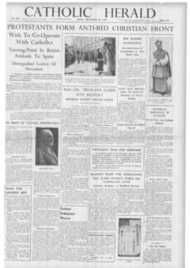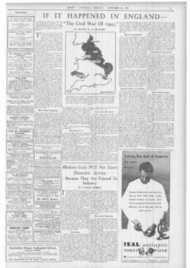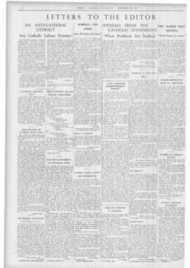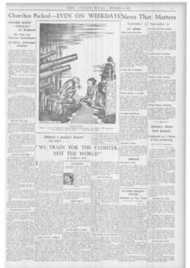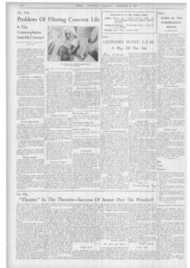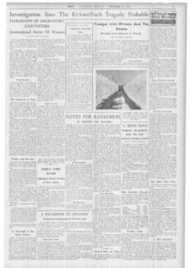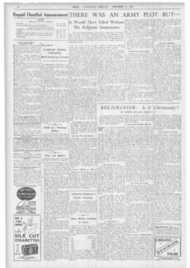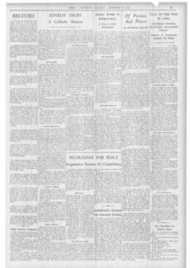Page 12, 24th September 1937
Page 12
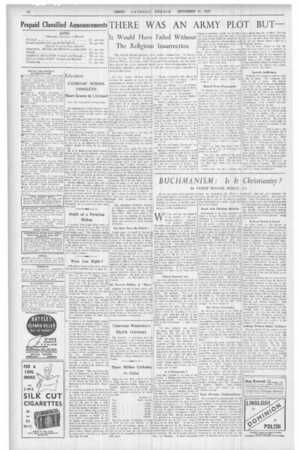
Report an error
Noticed an error on this page?If you've noticed an error in this article please click here to report it.
Tags
Share
Related articles
" In Franco's Spain "
Gen. O'duffy Accuses Capt. Mccullagh And Efen S Rich Brigade
European War
" I Am Frightened By Modern Warfare "
Letters To The Editor
THERE WAS AN ARMY PLOT BUT
It Would Have Failed Without
The Religious Insurrection
The Catholic .Herald publishes below further extracts from " In Franco's Spain," by Capt. McCullagh. In this week's extracts Capt. McCullagh and Sir Percival Phillips, the famous Daily Telegraph Corms ondent, who has lately died, discuss the severe treatment meted out to War Correspondents by the Nationalist authorities, and compare it with the war reception accorded to them in Red Spain.
Ten days before General Franco unfurled the standard of revolt in the market-place of Melilla, I passed that fortress in a vessel going from Majorca to Gibraltar, and, in the merciless glare of an African sun, it looked profoundly somnolent and peaceful. At that time, of course, the insurrection had already been planned. General Sanjurjo knew of it. General Mole knew of it. General Queipo de Llano knew of it. Colonel Yague knew of it. At least a hundred other Spanish officers knew of it. A few Spaniards in England knew of it, for. early in July, one of them, who is a naturalised Englishman, went hastily from London to Spain and brought all his relatives back to England with him, and as much of their money as he was permitted to take across the frontier.
But when questioned at the time, he maintained an absolute silence.
But there were Englishmen in the plot as well. It was an Englishman's airplane which brought Franco from the Grande Canaria to Ceuta.
Even now, those people say very little because they do not wish to emphasise the fact that this civil war began as a military rebellion, carefully prepared beforehand: they prefer to dwell on the rising of Catholic peasants which took place later in Navarre, New Castile, Andalucia, and other places, and to accuse the Communists of having concocted a great plot for the overthrow of the Madrid Government and the establishment in its stead of a Soviet republic. The Communists were certainly preparing, but I do not think that they meant to strike in the year 1936 as the country was not then ready for them, the followers of Lenin being far outnumbered in Spain by the followers of 13akunin.
But it cannot be denied that there was an army plot, and a very good one, conducted with exceptional secrecy and skill. . . .
They themselves confessed, however, to Cardinal Goma that were it not for the religious insurrection they would have failed. Their worst check at the outset was the defection of the Fleet, which made Mussolini's help indispensable, and consequentiy made England distrustful. . . .
The Reds Were the Rebels ?
I could never rid myself of the feeling that the Reds were the rebels and the Nationalists the Government, for the behaviour of the Reds was that of incorrigible rebels, while the behaviour of their enemies was that of men who carried on the traditions of the old Spain.
It was they who protested when Valencia offered Spanish Morocco as a bribe to France and England. It was they who objected when the English and the French interfered at Bilbao as they had interfered hundreds of times in the chaotic area occupied by the Reds. It was they who repaired the churches, bridges, aqueducts, and ancient memorials which the Reds had lightly destroyed. The Reds were always the destroyers: the Nationalists the re
builders. . .
Sir Percival Phillips on " Busty"
Suddenly through B door comes, with martial tread, a tall and menacing figure. It is that of a powerfully-built man dressed as an officer of the Foreign Legion, with Sam Browne belt, riding breeches, and high hoots. He strides through our annex with the ruthlessness of the German Kaiser when he was still on his throne, and on his powerful, clean-shaven face rests a scowl worthy of Mussolini when he heard of the imposition of Sanctions. . . " Tell me, for heaven's sake, who is this masterful personage? " I implore. "Don't be mysterious. Is it Franco? "
"No," says Phillips, " it's only El Sehor Captain Don Luis Torquernada de Bustamente, the head of the Press Bureau. . . ."
" Who is Captain Bustamentel " I asked, as soon as we reached Phillips's room. " He's a soldier, of course."
" Neither a soldier nor a journalist," was the reply. " He dabbled in journalism in London, where .be represented the A.B.C., a Madrid newspaper. He also sent contributions to the London papers, but only one paper, which is extremely conservative and aristocratic, took anything from him. I asked the Daily Mail man why they refused his articles and he said, with the usual politeness of Carmelite House :` Because they were d—d rubbish.' I suppose that's the reason why he's now treating the Mail men as if they were dirt beneath his feet. despite all that Rothermere has done for Franco and all that he can still do. . . .
"But why did General Franca put him over the correspondents? " 1 asked.
" Because he helped in some way to get the aeroplane which brought Franco from the Canary Islands to Morocco. I don't know exactly how he helped. Busty showed great presence of mind on the occasion, and great devotion to Franco. He is also very secretive. He told nobody. Franco rewarded him by putting him in charge of the Press, though why he didn't find him some other post beats me, for he has made himself hated like poison by the 'English and American correspondents, and this reacts on the whole news service and propaganda of the Nationalists. . . .
" He treats them as if they were criminals. He has expelled a good many, and some of those victims have gone to Madrid or Bilbao, where they may yet find themselves in a position to harm both him and the whole Nationalist cause. . . .
"Moreover, on the other side, correspondents are treated much better. I have met dozens of fellows who are in Barcelona and Madrid, and they told me that, though there was hopeless confusion, they were always treated like brothers. . . .
Madrid Press Propaganda
"In Madrid they have a very efficient but rather mysterious Englishman called Cowburn, organising their propaganda and acting as Press censor. He has thrown himself heart and soul into the work, and though he wears a rather shabby civilian dress and hob-nobs with all sorts of correspondents, even when they represent only tuppence-ha'penny Communist papers in places like Latvia and Mexico. and doesn't go prancing about in a Sam Browne belt, he is a million times snore useful to the Reds than our bellicose Busty is to the people here. Busty won't look at a crank or a poet, but Cowburn dotes on them. An English poet out there became so enthusiastic that he took up arms, joined the Red militia, and was shot outside Madrid. The Reds regard him as one of their martyrs, and are going to put up a plaque to his memory. . . ."
" How is it, Mac, that there's such a tendency on the part of newspaper reporters to go Red? "
" You have just answered that question yourself," I replied. " The Reds are more friendly to them. The anti-Reds too often treat them with Castilian hauteur. . . ."
" Undoubtedly the Red generals are
more affable than the anti-Red. You can approach them, borrow a light from them, and even ask them about their plans, but you are not allowed within a mile of a Nationalist general. . . .
We are never allowed to visit the Madrid Front when it is in eruption, so that we cannot testify, as eye-witnesses, that the Nationalists do not slaughter all their prisoners. We have never seen a village taken, so that, though we find some villages absolutely empty, we cannot tell for certain whether the villagers were slaughtered or not by the Moors. . . ."
Spanish Inefficiency
"Probably this attempt to hide the truth is due to shame. This arrogance may also be due to shame. The Spanish generals will not let foreign correspondents poke their noses into camps lest they should spy out the nakedness of the land, lest they see how bad is the equipment, drill, discipline, and everything else, how antiquated is the armament, how poor the battalion mess, how primitive all the arrangements. I saw for myself that they never dig latrines for the men. . .
" Of course, that's the system in civil life. I tried to see the old Moorish castle in Badajoz, but couldn't walk a step on account of the filth. Exactly the same around the walls of Peking. The riverside in Talavera de la Reina, which might be made into a splendid promenade, is left in a frightful condition.
" This unheaval in Spain is partly due to a reaction against thisdecadence and it had got to come, either from the Left or from the Right. The Left said: We'll chuck Christianity altogether and try the Soviet system. We'll burn every church in Spain, for it was the Church that brought about this downfall.' The Right said: We'll raise ourselves up as the Italians have raised themselves up, without abandoning Christianity. Our religion contain; within itself, the germs of renovation.'
"I think this is the explanation of Busty's arrogant insolence. He's ashamed of Spain, but tries to conceal his shame by bursts of savage impoliteness."
blog comments powered by Disqus


